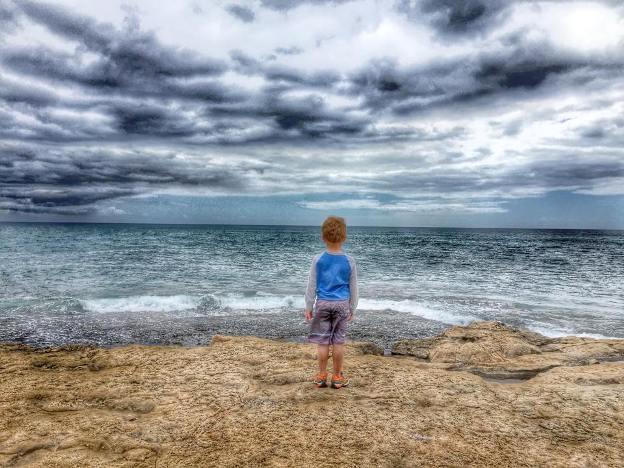Dear Grandson,
I feel so lucky that you and I share so many similar characteristics.
We are truly a team! For example, we both love reading, running, and laughing. And don’t forget ice cream, hot dogs, pizza, and chocolate chip cookies. There are even some things that we both don’t like—loud noises, bright lights, crowds of people, yelling, and being rushed.
Recently, I learned that we share something else: anxiety.
Since anxiety is something I’ve had since I was young, I thought I’d share my experience with you. What I know for sure is that there is nothing wrong with being anxious. It is how our brains are organized and it is absolutely okay. We see the world in our unique and perfect way.
It took me a long time to figure out what anxiety feels like in my body. Since I have always felt anxious, it’s difficult to know what any other way of being would feel like.
It’s hard to describe feeling anxious, but to me, it seems like having one foot on the brake and one foot on the accelerator. There is always a background sense of some internal hum, some energy constantly moving through my body. My inner self never seems to be completely quiet or at rest. My mind races from one thought to the next quickly.
Sometimes, anxiety affects my body. I get sweaty, my heart races or beats wildly in my chest, I get a headache, or I even feel nauseous. I might hunch up my shoulders near my ears, tighten the muscles in my body, squeeze my jaw, or clench my fists.
These things can happen when I know what I’m worried about and even when I don’t know what I’m worried about. Being anxious about a test at school or an important race makes sense, even if it is uncomfortable, but being anxious without knowing why is frustrating. It’s a feeling that something is going to happen, but I don’t know what or when.
I’ve learned that anxiety makes it difficult for me to relax and even sometimes difficult to sleep. When I don’t pay attention to it, it can make me grumpy, unkind, argumentative, or sad. It’s kind of like always being on alert, waiting for something to happen. This kind of thinking can make it hard to concentrate, difficult to sit still, and challenging to learn and to listen.
When I’m anxious, part of me wants to run away from those feelings but I’ve learned that doesn’t work. I have to recognize that I’m anxious and find ways to take care of myself.
Anxiety can get in the way of having fun, so it’s important for you and me to learn ways to tame our anxiety.
I have learned many tricks and techniques to turn off, or at least turn down, my anxiety. The biggest trick is to recognize when I’m feeling anxious. In fact, the most important thing is to notice what’s going on. It’s not as easy as it sounds.
I have to practice paying attention to what anxiety feels like. Only when I realize I’m anxious am I able to respond. I need to slow down, take a few breaths, drop my shoulders, unclench my fists, and let my tight muscles release. Then I can see if my heart is beating fast or if my thoughts are racing through my mind. Once I notice these physical sensations, it is easier to adjust them.
When I notice racing thoughts, I tell my mind, “Stop. Thank you for sharing, but one thought at a time please.” Just doing something like that helps.
I have a name for my fast-moving, always-thinking brain: Buster. That way I can say to myself, “Enough Buster, I’ve got this. Take a break.”
I try to remember that I do not have to believe everything my thoughts are telling me. My brain’s job is to think, and it does it well, all the time. But the thoughts my brain are thinking are not necessarily true. I need to pause long enough between thoughts to ask myself, “Is this true? Buster, are you lying to me again?”
I’ve learned lots of other ways to tame my anxious mind. My favorite is working with my breath. Big, deep, slow belly breaths through my nose with my mouth closed make a huge difference. So does changing the direction of my breath. I inhale down into my belly and feel it expand (I put my hands on my belly to make sure it is getting bigger), and I exhale from my belly back up and out my nose. The best part of these breathing tricks is that I can use them anywhere I am and no one knows I’m doing them.
Another trick is to sit quietly and watch my thoughts. That’s different than thinking my thoughts. I just watch them as if they were moving across a TV screen but I don’t get involved with them. I see them but without thinking, only watching. “There goes another thought. There goes an idea. There goes a worry.” I try to label my thoughts as they move through my mind.
Exercise helps everything but especially anxiety. I always feel better when I do something active every day. Run, bike—just moving my body is important and makes a huge difference. When I’m moving, I am not as anxious. My mind seems to connect with my body and slow down, and I feel better.
Another anti-anxiety thing that always seems to work is a body scan. Are my face, my jaw, my teeth, and my tongue soft or hard? Where are my shoulders, up or down? Are my fists clenched? What about my tummy? I scan all the parts of my body and if something is tight, I try to let it go. It’s not always easy to do but just the noticing helps. Unwinding and softening my body helps my mind to slow down.
And then there’s what I eat. Healthy food really matters. What I eat is fuel for my brain, and my brain requires good, nutritional food. I try to eat as little sugar as possible because I just feel better when it’s not in my body. Lots of protein, fruits, and vegetables make the most sense. Pay attention to what happens after you eat something. Did what I just eat make me feel better?
Do you know what it means to trust?
I think of it as believing that everything is going to be okay.
When I’m anxious, worried, or having racing thoughts, it’s difficult to believe that things will be okay. I believe something I have already done or something that is going to happen will mess things up. I do not trust that everything will be just fine and in fact, I’m sure that it won’t be.
When I find myself convinced that things are falling apart, I try to remember to trust. I look back at what has happened in the past and remember that almost all of the time, everything has turned out okay. I remember that the things I’ve been worried about hardly ever happen. I remember that I am just fine right in this minute and that I’ve been okay in the past. There are people all around me who love me and want the very best for me—and they are there if I need to ask for help.
Trust is really important. I need to strengthen my trust, and just like strengthening a muscle, I need to use trust often. Every time things look really confusing, I rely on trust to move me through. Everything will be okay and there are always people to help me.
Anxiety is a trait I was born with and is part of what makes me who I am.
If I try to not be anxious, I am trying to get rid of something that is part of me, and I risk losing the positive things that come with anxiety.
I am alert, aware, creative, bright, and observant.
Wyatt, I love you with all of my heart, to infinity and beyond. Anxiety is only one small piece of the exceptionally wonderful boy that you are. Learning as much as you can about anxiety will allow you to focus on all the other incredible things that make you so extraordinary—your contagious sense of humor; your creative, artistic brain; your sweet, loving temperament; your unbridled energy; your inquisitive nature; and your athletic skills. I am certain that your future is bright, and filled with amazing accomplishments and wonderful people.
And I’m thrilled that as a team, we have had the shared opportunity to do this thing called living!
Cuddles, hugs, love, and laughs,
Nini
~
Author: Karen Ann Leonard
Image: Paul/Flickr
Editor: Catherine Monkman
Copy Editor: Leah Sugerman
Social Editor: Waylon Lewis









Read 4 comments and reply